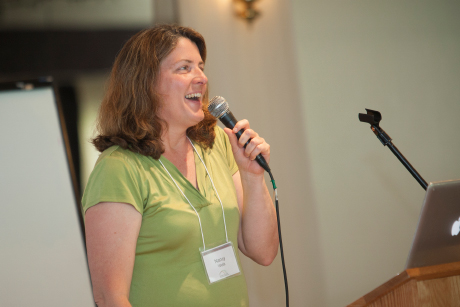By Ted Boscia
Reprinted from Cornell Chronicle, June 9, 2014

Do school gardens influence kids’ diet and physical activity? Does hip-hop belong in the classroom? How can teens use Facebook, Twitter, Snapchat and other social media responsibly?
Cornell faculty experts addressed these and other questions for nearly 50 Cornell Cooperative Extension (CCE) county leaders, 4-H educators and community partners at the fourth annual Youth Development Research Update, June 3-4 in Ithaca. Sponsored by the Bronfenbrenner Center for Translational Research (BCTR) in the College of Human Ecology, the event joined researchers and practitioners from across New York state to discuss new findings, develop partnerships and identify areas for further research.
“The research update informs practitioners about research-based knowledge they can draw on in their work,” said professor of human development Stephen Hamilton, who co-hosted the event with Jutta Dotterweich, training and technical assistance coordinator for the BCTR’s ACT for Youth Project. “It fosters dialogue that enables researchers to understand what is most important and most useful to practitioners and ultimately for both to find common ground for collaboration.”
To open the conference, Robert Sternberg, professor of human development, shared his current work on ethics. Doing right, he said, ought to be easy, but “it’s actually quite hard.” He presented his theory of eight steps to ethical behavior, progressing from dilemma recognition to action. “At every step there’s the option to check out, any one of which can lead to a failure to act.” Sternberg advised that schools and youth programs integrate ethics into a range of subject matters rather than treating them separately.
Environmental psychologist Nancy Wells, associate professor of design and environmental analysis, detailed her school gardens research, which found that gardens prompted grade-school children to be more physically active in classes and at home.
To show the hazards of teaching hip-hop in schools, Travis Gosa, assistant professor of Africana studies in the College of Arts and Sciences, described how a Florida middle school teacher was suspended this year for asking her students to evaluate the literary devices used in a violent, sexually explicit rap song. Despite this, Gosa, who is writing a book on hip-hop-based education, said such music and culture can be taught responsibly, “in a way that reflects an understanding of the history and politics of hip-hop and its impression on young people.”
Social media presents another minefield for young people, said Natalya Bazarava, assistant professor of communication. Teens often share intimate information without weighing the consequences, her studies have found, and she advised teaching youth about the Internet’s wide and lasting reach.
To conclude, Lorraine Maxwell, associate professor of design and environmental analysis, shared her work on children’s perception of their school environment and its effect on their academic achievement and well-being. Her work found a troubling chain reaction: when students rate the quality of their school facilities poorly, it lowers their perception of the school social climate, leading to decreased attendance and subpar academic performance.
For Tim Davis, 4-H youth development extension issues leader for CCE Ontario County, the conference helps to spark connections with faculty members seeking to test their ideas in the field. At last year’s event, he met Jane Mendle, assistant professor of human development; together they launched a multiyear study of writing interventions for teen girls. He is pursuing research partnerships with three other Cornell professors.
“Often, we are eager to work with professors, and they want to run research in community settings, but that can’t happen without first building a relationship with the faculty member,” Davis said. “This research update gets us talking about the possibilities.”
Ted Boscia is director of communications and media for the College of Human Ecology.
Related Links:
Bronfenbrenner Center for Translational Research

